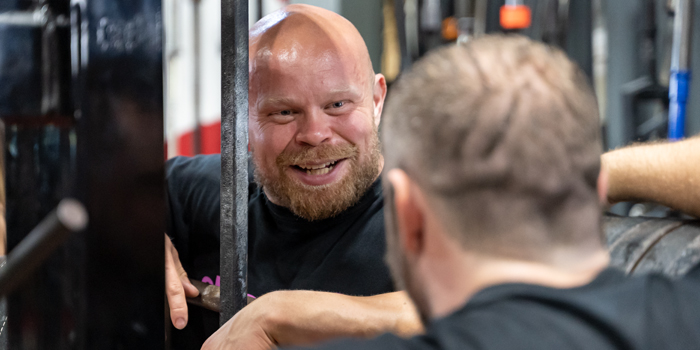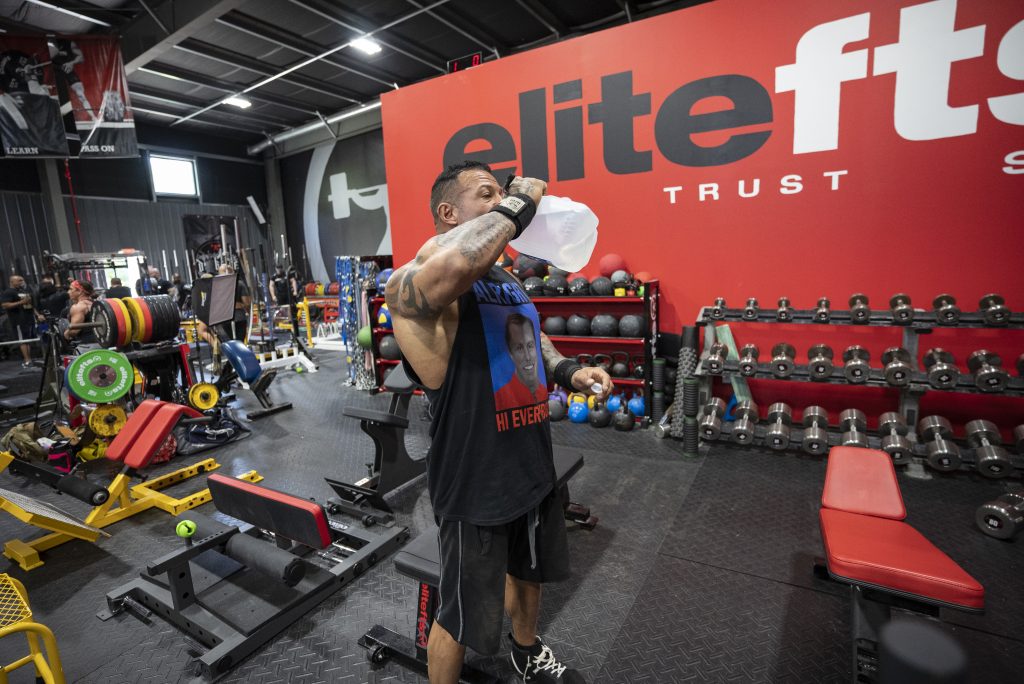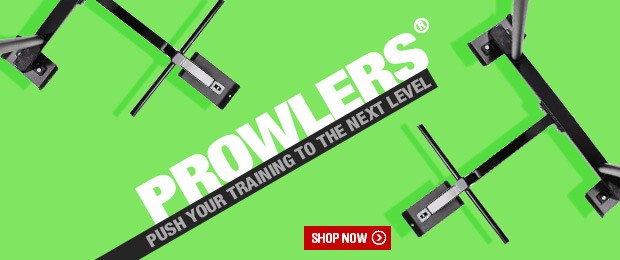
I’ve recently dropped 75 pounds, going from 314 to 239. As much as I don’t want to admit it, this is the third time I have lost a significant amount of weight as a powerlifter—meaning that I have failed to keep the weight I’ve lost off twice. The value of those failures is that they have granted me the ability to ask why the diets were unsuccessful, why I couldn’t keep the weight off, and what I could do differently to succeed the next time. If you're in the same situation, here's what I’ve learned along the way that may help:
Ask Yourself Why You Are Trying to Lose Weight
Why do you want to lose weight? It won’t help your total. Dropping pounds from your body won’t put pounds on the bar. If you are a strength athlete, the primary objective is to be strong, so why pursue something that will not increase strength?
NEW: Time as a Factor in Weight Training
Even if weight loss doesn’t make us stronger, the legitimate reasons to lose weight are still numerous—maybe it's related to health, perhaps it’s cosmetic, or maybe you think you could be more competitive at a lighter weight class. If you can understand why you want to drop weight, you can better guide yourself through the process. More importantly, you can give yourself more reason to continue once things get difficult because they will at some point.
No matter the reason why you’ve chosen to lose weight, commit to it. Remember that reason, remember what it means to you, and use it to stick to the cause.
Figure Out What You're Eating
The only way to lose weight is by establishing a calorie deficit. You NEED to take in less energy than you burn if you want to lose weight. That is a fact; there is no way to avoid it. You can’t manipulate macronutrients to avoid being in a deficit. No diet will allow you to break the laws of thermodynamics.
If you need to be in a calorie deficit to lose weight, how do you establish one? Couldn’t you pull a calorie number out of the air and see what happens?
A more intelligent approach would be first to figure out what you eat and your typical daily calorie intake. Find an app to track your intake or do it the old-fashioned way with a pen and paper. If you are consistent with your eating day to day, establishing your baseline calories will be easy. If you are inconsistent, it might take a few days to figure out your average intake.
Once we have your baseline intake established, you can then begin making changes based on your size and the rate of loss that's acceptable. Pull 100-300 calories (depending on your starting point) from your baseline intake for a starting point. Stay there for a week and see how your weight responds. As long as you are dropping, there is no need to make any changes.

Lose enough weight, and eventually, the loss will stall out. When this happens, don’t panic. Wait a few days to see if things have stabilized, then take another small drop down in calories. Continue this process as necessary.
Prioritize Protein
If you are dropping more than a couple of pounds, some degree of strength loss will be inevitable. Even though it is inevitable, we still want to minimize it. How can we help to minimize the loss of strength through a diet? By maximizing the amount of muscle mass that is maintained through the weight loss.
There is no way to guarantee that muscle loss won't happen. To mitigate, ensure that protein consumption is high through the diet so that amino acids are present to repair tissue and build enzymes without pulling them from your muscle.
A secondary benefit of increased protein consumption is that the energy required to digest protein is higher than the energy needed to digest carbohydrates or fats. That isn’t saying that you can eat unlimited amounts of protein and drop weight, but it’s saying that gram for gram, consuming protein vs. other macronutrients will burn more calories through digestion.
Increased protein consumption will lead to higher levels of satiety, meaning that consuming higher levels of protein can lead to decreases in hunger. This tool can become very valuable when you get deep into a diet.
I’ve played the game of dropping protein to increase carbohydrate consumption while still maintaining a deficit. The logic was more carbs would mean more energy, which does check out to an extent. Going too far that way, though, I ended up getting softer and experiencing a greater rate of strength loss.
Take Your Time
We want to see the most results in the least amount of time possible. We don’t want to be forced into a prolonged diet. But an attempt at rushing it has only led to feeling worse in the short term, losing muscle and strength, then rebounding once the diet is over.
Doing what can only be described as a crash diet is dropping out all carbs while keeping fats low. It'll make the scale move pretty quickly, but it's also going to leave you looking and feeling like a flat tire. Sure, you might lose 20 pounds in two weeks, but how much of that is fat? How much of that is water and lean tissue? How long can you realistically sustain that for?
I credit most of my recent success while dieting to maintaining a sustained rate of loss rather than trying to get as much loss per week as possible. Going slower, I was able to feel the best I ever had through a diet. I had less temptation, and I was better able to control myself on the backside of the diet.
Weight loss is more than just getting there; it’s about getting there AND being able to stay there. Set yourself up to do both.
Accept Any Strength Loss
I’ve said this already here, but I’ll repeat it. If you are dropping any significant amount of weight, you will not be getting stronger UNLESS you are an absolute beginner or extremely overweight. In the absolute best-case scenario, your strength will stay about the same. Most of the time, you'll get weaker due to changes in leverages and lack of fuel.
One of the hardest parts of weight loss for a strength athlete is the strength loss that will come with it. You need to remember why you are trying to lose weight and remember that while you are dieting. Weight loss is the driving factor, so the goal through a diet is not to be strong. Therefore, why should you be concerned if strength falls off?
Keep in mind that once you are at your goal weight, strength will begin to come back. You will no longer be in a calorie deficit, and you will have time to get used to your new leverages.
While dieting, I made a mistake: panicking because of strength loss and immediately pulling the plug to stuff myself. Sure, that helped strength come back, but it also caused me to blow right back up to where I was prior to dieting. Accepting strength loss and being patient while building it back up has helped tremendously with my success this time around.
Have a Plan for When You Are Done
With my previous failures to keep weight off, the biggest factor was my lack of a plan for the end of the diet. I’d just finished what felt like starving myself for months on end, I wanted to eat, so I ate whatever I wanted. I thought that I deserved to eat, that I had earned the right to celebrate. In my prolonged celebration, I ended up undoing the work I was trying to celebrate.
I am not saying that you can’t have a cheat meal at the end of your diet. A single cheat meal will not send you back to your starting point, but a series of cheat meals every day for a month could do some damage.
So, have your cheat meal when you reach your goal. You probably did earn it. At the same time, reward yourself for the discipline you displayed through your diet by being disciplined enough not to undo your accomplishments. Plan your exit strategy. Plan how you are going to get yourself back to maintenance calories.
What are Your Options?
The safest is a reverse diet. You could slowly add 1-200 calories back in on a weekly basis until you begin to maintain body weight. The pro of this is that you are less likely to accidentally regain unwanted body weight. The con of this strategy is that it will be a tedious process that will make you feel like you are prolonging the restriction.
Or, you could jump back up to your old baseline calories. It might not be the perfect number for you now that you’ve dieted down, but you can use it as a start point to adjust. This approach will allow you to eat more sooner but will require you to pay more attention to your body weight and energy levels to make any necessary changes.
Take Homes
The plan doesn’t have to be complicated, but it needs to be a plan that you can stick to. A calorie deficit needs to be in place, and you will likely have to drop your calories lower and lower the further you get in the diet. You need to ensure that you are getting enough protein in, not just for the maintenance of muscle mass, but for the satiety and increased energy expenditure that will result. Take your time. Rushing might get you there sooner, but it won’t help you stay there upon arrival. Accept that you will get weaker through the diet, but remember that if you are patient, strength will come back. Lastly, make sure that you have an exit strategy so that you don’t use the end of the diet as an excuse to eat 30 pizzas in 30 days.
Seth Albersworth is a powerlifter with experience in and out of gear. His best totals are 2,000 pounds raw and 2,403 pounds multi-ply. Seth has completed his bachelor's degree in kinesiology from the University of Calgary and is currently studying to become a Doctor of Chiropractic at Palmer College of Chiropractic's Florida Campus.











2 Comments